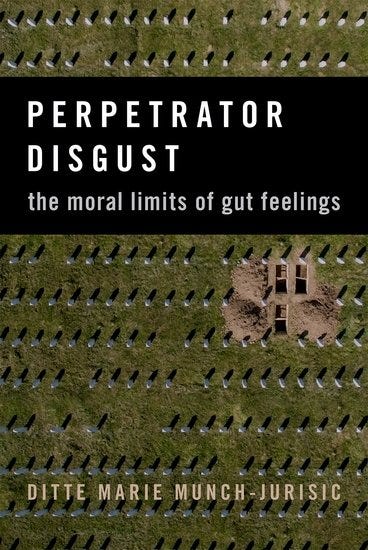Perpetrator Disgust: The Moral Limits of Gut Feelings
A conversation with Ditte-Marie Munch-Jurisic
In this video, I talk to Ditte-Marie Munch-Jurisic about her book Perpetrator Disgust: The Moral Limits of Gut Feelings, published by Oxford University Press earlier this year. That I think that this is an important work is clear from my blurb for the book:
The topic of perpetrator disgust—the tendency for perpetrators to recoil in horror from the atrocities that they have committed—has been a grossly under-researched topic, but one that is crucial for understanding genocide, dehumanization, and moral psychology more generally. As the first extended scholarly treatment of this phenomenon, Perpetrator Disgust is a landmark accomplishment that will be an indispensable resource for scholars for decades to come.
In the book Munch-Jurisic, provides paradigmatic examples of this phenomenon, such as Heinrich Himmler’s reported reaction when witnessing a mass shooting of Jews, and the revulsion experienced by the seemingly conscience-free mass murderer Anwar Congo after reenacting his crimes.
Munch-Jurasic both describes and interrogates addresses the various ways such events have been interpreted. Christopher Browning, the author of the famous book Ordinary Men: Reserve Police Battalion 101 and the Final Solution in Poland understood it as an expression of moral revulsion, whereas Daniel Jonah Goldhagen, author of Hitler’s Willing Executioners: Ordinary German and the Holocaust, understands perpetrators’ repugnance as an aesthetic abhorrence to the stench and mess of slaughter. Hannah Arendt wrote in Eichmann in Jerusalem that the problem perpetrators face is “to overcome not so much their conscience but the animal pity by which all men are affected in the presence of physical suffering” (a position, by the way, that is very similar to my own).
Munch-Jurisic turns a philosopher’s discerning eye to these accounts, sympathetically but also critically unpacking them. She goes on to address perpetrator disgust in the context of her more general, constructivist account of emotion.
Perpetrator Disgust is engaging and accessible to the general reader, as well as being an important work for scholars concerned with the moral psychology of violence. Very highly recommended!




